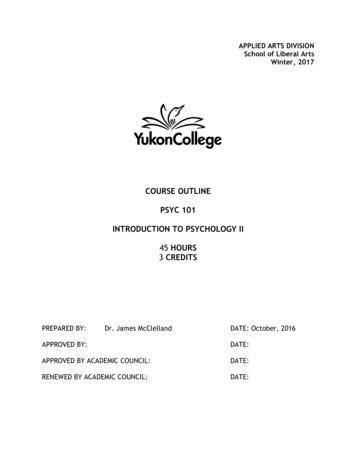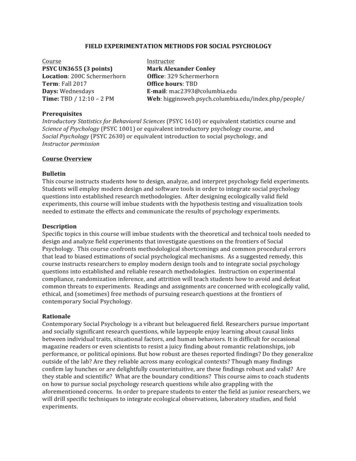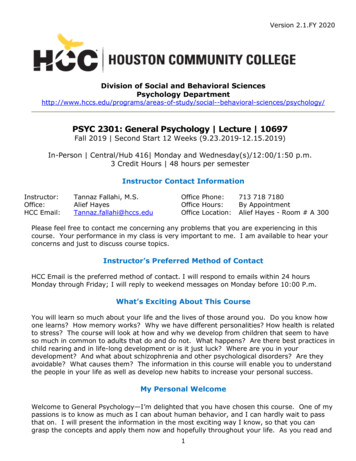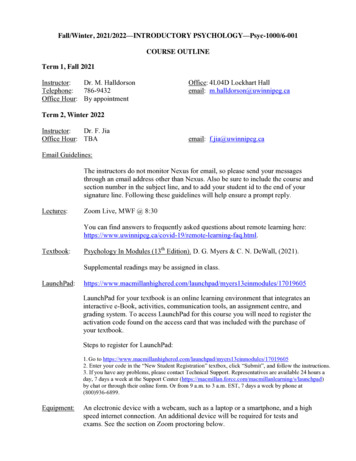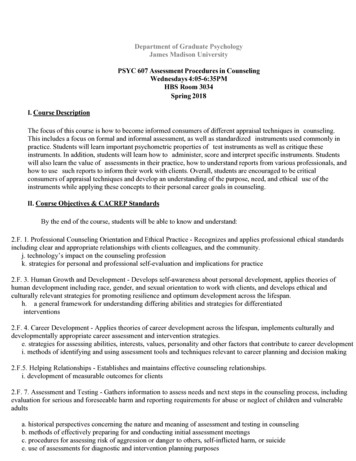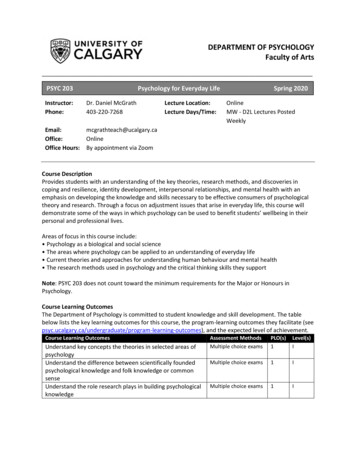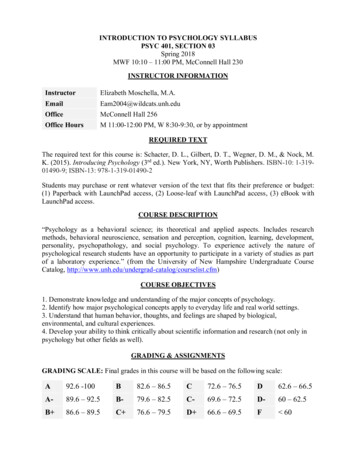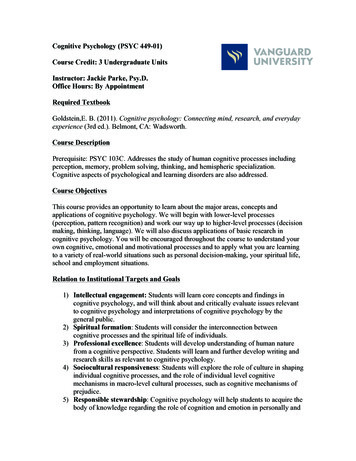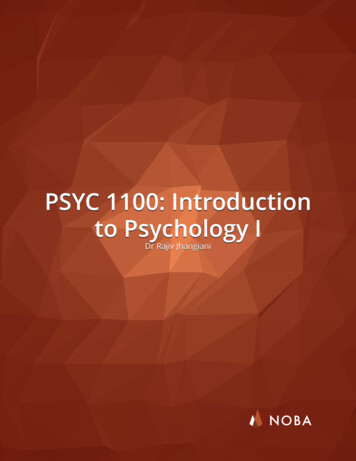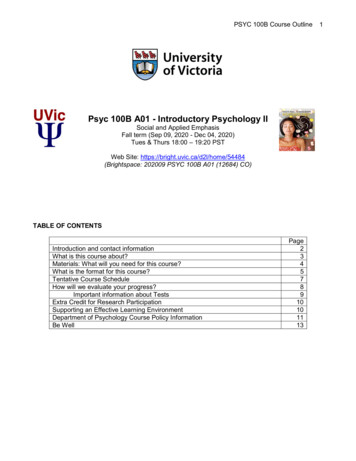
Transcription
PSYC 100B Course OutlinePsyc 100B A01 - Introductory Psychology IISocial and Applied EmphasisFall term (Sep 09, 2020 - Dec 04, 2020)Tues & Thurs 18:00 – 19:20 PSTWeb Site: https://bright.uvic.ca/d2l/home/54484(Brightspace: 202009 PSYC 100B A01 (12684) CO)TABLE OF CONTENTSIntroduction and contact informationWhat is this course about?Materials: What will you need for this course?What is the format for this course?Tentative Course ScheduleHow will we evaluate your progress?Important information about TestsExtra Credit for Research ParticipationSupporting an Effective Learning EnvironmentDepartment of Psychology Course Policy InformationBe WellPage2345789101011131
PSYC 100B Course OutlineInstructor: Liz WilliamsEmail: williamsliz@uvic.caOffice hours: Tuesdays 18:00 – 19:20or by appointment2Teaching Assistant: TBAEmail:Office hours:We thank you in advance for your patience as we do our best to support the many students enrolled inthis course. We do want to hear from you!Before emailing with a question, please check for the answer in the course documents (e.g.,syllabus, rubrics), Brightspace, and discussion forums, or ask your peers. If you can’t find the answer,use the list below to determine whom to contact.In your subject heading, please include “PSYC 100B”.We will try our best to respond to emails within 24 hours (during office hours, Mon to Fri). Close to duedates and tests we are likely to have a higher volume of questions, so be sure to plan ahead.If you have questions / comments regarding: What is my grade?I would like feedback on my grade(s).How can I improve?I am having trouble understanding this material.I am interested in a particular topic and want toknow where I can find more information.Assignment or test accommodations (e.g., illness)Technical issues with computer, e-mail, Brightspace,Zoom, Netlink, login, password Registering, purchasing, or logging in to LaunchPadResearch participation bonus pointsContact:All grades are posted on Brightspace, asavailablePlease attend office hoursInstructor: Liz WilliamsComputer help deskhelpdesk@uvic.ca; 250-721-7687Clearihue A004 or McPherson LibraryCustomer Support online, 24 hrs, 7 days unityOR 9 a.m. to 3 a.m. EST, 7 days a week at(800) 936-6899Research participation coordinatorDr. Jim Tanaka at p100res@uvic.ca
PSYC 100B Course Outline3Welcome to Psychology 100BWe acknowledge with respect the Lekwungen peoples on whose traditional territory the universitystands and the Songhees, Esquimalt and WSÁNEĆ peoples whose historical relationships with theland continue to this day. We feel extremely privileged to learn, work, teach, and play on this beautifulterritory.Hello! This semester is likely looking different than what you were anticipating when you decided youwanted to go to university – I hope to make the best of this situation. We’ve put a lot of thought intohow to deliver this course online in a way that helps you understand and apply important theories andconcepts. Introductory Psychology is a course we are passionate about and we hope to engage thoseof you interested in majoring in psychology, as well as those of you who are non-psychology majors, inreflecting on how psychology can be used to tackle important issues in our communities and morebroadly, in the world.We hope this course will interest and challenge you. Did you know that introductory psychology is oneof the most popular classes in post-secondary institutions world-wide? Psychology, as a field of study,has obvious intrinsic appeal: exploring the nature and causes of human behaviour is exciting! Yet thevery accessibility and familiarity of psychology can pose a problem. Although we believe we havegood, common-sense views of psychology, our perspectives are fundamentally shaped by ourpersonal experiences, our contexts, and our folk wisdom. Our perspectives might not all be wrong, butthey can sometimes interfere with our approaching the study of behaviour from other points of view.We are here to help you explore this issue both in this course and in the future, if you advance infurther psychology courses.This term, we have hundreds of students taking introductory psychology. Although it may not bepossible for us to meet with all of you personally, we really like to engage in conversations with asmany of you as we can. We encourage you to take the initiative and make contact with us during ourvirtual office hours, on the course forum, or by e-mailing us with a question about psychology.We wish you the best for a successful and productive learning experience in Psychology 100B!What is this course about?Psychology is an exciting and complex scientific discipline, and it is an essential part of the helpingprofessions as well. We designed PSYC 100A and PSYC 100B to provide an overview of: the main areas, findings, and methods of modern psychology various theoretical perspectives and professional orientations within psychology scientific methods of gathering information and forming conclusions from the study of humanbehaviour and functioning psychological principles that serve as a foundation for taking more advanced courses inpsychology and related disciplines how psychological principles have been used to help people lead better, healthier lives, and tosolve real world problems how to locate and utilize psychological research informationPSYC 100A focuses on the historical, methodological, biological, learning, and cognitive aspects ofpsychology. PSYC 100B focuses on human intelligence, personality, child and adult development,psychological disorders and psychological treatment. Please see the graphic syllabus below for anoverview of the course topics. You do not have to continue on to PSYC 100A after you have
PSYC 100B Course Outlinecompleted PSYC 100B, but you should be aware that if you wish to take any further courses inPsychology at the University of Victoria you have to complete both PSYC 100A and 100B.Materials: What will you need for this course?Required Technologyo Reliable internet connectiono Laptop or desktop computer (most features of this course are compatible on a tabletwith a web browser, however, when using a tablet, some features may not work asexpected).Course Websiteo The PSYC 100B course page is accessible through the UVic Brightspace system(http://bright.uvic.ca). As an online course, this site is central to your participationand completion of the course. Please sign-in regularly and keep up-to-date onthe content and announcements. The site includes a copy of the course outline,notes, assignments and rubrics, and other essential information.o To access Brightspace you will need a valid UVic Netlink ID. Register athttp://netlink.uvic.ca/. If you can’t access Brightspace after receiving your NetLink ID,contact the computer helpdesk (helpdesk@uvic.ca; 250-721-7687).4
PSYC 100B Course Outline5Videoconferencingo To participate in group discussions, office hours, and other course activities, you willrequire access to your Zoom account, hosted through UVic. You are required to sign into Zoom using your Netlink ID: https://uvic.zoom.usRequired Text and Online Resource Material Myers, D.M. and DeWall, C.N. (2018). Psychology (12th ed.) New York: Worth Publishers.o You have the option to purchase the text at the bookstore as looseleaf pages that go ina binder, or as an ebook. You should have continuing access in order to master thematerial. We recommend ordering your textbook as soon as possible because itmay take some time for you to receive it (even if it’s the ebook).o Both options include access to online resources, including an online version of the text,at the publishers LaunchPad website. Textbook “LaunchPad” Online Study Resourceso If you purchased your textbook from the bookstore, you will have received an accesscode for the Textbook website hpad/myers12e/10729915o Please bookmark the page to make it easy to return to.o Please register using the same name you used when registering for this course.This will ensure we correctly allocate your marks from LaunchPad activities.o If you have problems registering, purchasing, or logging in to LaunchPad, do NOTcontact us until after you have contacted the publisher’s Customer Support. You canreach a representative 24 hrs, 7 days a week through the online form, by chat ty or 9 to 3 a.m. EST, 7 days a week by phone at (800) 936-6899.What is the format of the course?This course is offered fully online and blended (a mix of “real-time” and asynchronous sessions). Thismeans that you will be expected to attend the regularly scheduled timeslots for some live(synchronous) activities, discussions, and tests. Other aspects of the course will be asynchronous,including pre-recorded videos, self-directed learning activities, etc.You will be asked to complete some mini activities as an introduction to psychology, followed by eightchapters, or modules. Activities for each module include:To read and review One assigned textbook chapter Chapter summary slides that highlight important course concepts Pre-recorded mini-lectures, and additional learning material (e.g., a video, article orpodcast)To complete and submit Mini-activities related to the content of each module Group discussions on Zoom, followed by an individual reflection Learning Curve quizzes for each chapter (on LaunchPad)On Tuesdays, from 18:00 to 19:20 PST, we will offer a live class session on Zoom in which you cancome and pose questions (office hours) and work on your weekly activities. These classes are notmandatory, but if you can make it, we’d love to see you there! On Brightspace there will also be adiscussion forum for you to ask any questions you may have (e.g., about material in the chapter or
PSYC 100B Course Outline6one of our mini-lectures that requires further clarification, or additional information you’d like on a topicthat you found interesting). As needed, within a week we will have posted a recorded mini-lecture, or aposted document that responds to the questions we received.On Thursdays, from 18:00 to 19:20 PST, you will participate in a group discussion on Zoom. Duringthe first week of class we will assign you to a group that you will work with throughout the term. Groupparticipation is mandatory for completion of this course. (You may also decide to arrange additionalstudy time with your group throughout the term)You will also complete three tests and three assignments, used to assess your understanding of thecourse content. Details are listed below (See: How will we evaluate your progress).Online courses can be tricky to complete if you do not stick to a schedule. The format for this course isdesigned to help you stay on track. Psychology is a scientific discipline, and as such it requiresconsiderable thought and time to develop an understanding of psychological research and principles.We expect you to complete the assigned weekly materials, to attend and engage in virtual classroomtime and office hours when needed, and to spend several hours a week towards mastering the coursematerial. And don’t forget to check the Brightspace website often! All course materials will be availablethrough Brightspace (http://bright.uvic.ca).
PSYC 100B Course OutlineWeek123Tentative Course ScheduleWeekReadingTopic(s)Key Dates:MiniReflections &StartingTests and AssignmentsActivitiesLearningMondayCurve QuizzesSuggestion: Submit all tests, quizzes, mini-assignments, and reflections well before deadlines,to avoid technical issues. Late submissions will not be accepted.Sep 7CourseCourse Intro Due Friday(ClassessyllabusDeveloping17:00(reflection only)start Sep 9) Through the LifeCh 5SpanSep 14Intro Quiz: Due by ThursCh 5DevelopingDue ThursDue FridayThrough the LifeSept 17, 17:0017:0017:00SpanSep 22 is last day to drop courses and receive 100% of tuition fees. Sep 25 is last day to add coursesSep 21Ch 10IntelligenceDue ThursDue Friday17:0017:004Sep 28Ch. 115Oct 05StudytipsReview/catch-up7Oct 19Ch. 13SocialPsychology8Oct 26Ch. 14PersonalityWhat drives usAssignment 1:Due Thurs Oct 1, 17:00Due Thurs17:00Due Friday17:00Test 1: Thurs Oct 8(Ch 5, 10, 11)Available 16:00 – 20:00Oct 16 is the last day to drop courses and be reimbursed 50% of tuition fees final day to submit request foralternative to research participation credit6Oct 12Ch. 12Emotions, stressDue ThursDue Fridayand Health17:0017:00Assignment 2:Due Thurs Oct 29, 17:00Due Thurs17:00Due Friday17:00Due Thurs17:00Due Friday17:00Oct 31 is last day to drop courses without penalty of failureTest 2: Thurs Nov 5StudyReview/tipscatch-up(Ch 12, 13, 14)Available 16:00 – 20:00Ch. 15PsychologicalReading BreakDue ThursDisordersNov 9-1117:009Nov 0210Nov 911Nov 16Ch. 15Ch. 1612Nov 23Ch. 16PsychologicalDisorders TherapyTherapy13Nov 30StudytipsReview/catch-upAssignment 3:Due Thurs Nov 26, 17:00Test 3: Thurs Dec 3(Ch 15, 16)Available 16:00 – 20:00Last day for ResearchBonus Points: Fri Dec 4Due Thurs17:00Due Friday17:00(reflection only)Due Friday17:00Due Thurs17:00Due Friday17:007
PSYC 100B Course OutlineHow will we evaluate your progress?You will be graded on assignments, tests, and participation in course activities, including surveys,discussions, and reflections. Your final grade will be based on the following criteria:%grade4Evaluation toolFormatPurposeDate(s)Intro quizOpen book test. Primarilymultiple choice. Quiz andinstructions posted onBrightspace.ThursSept 1715Test 1(Ch 5, 10, 11)Test 2(Ch 12, 13, 14)Test 3(Ch 15, 16)Assignments x 3(10% each)Open book tests. Primarilymultiple choice. Tests areheld in Brightspace. Youmay begin between 16:00and 20:00, and will have 80mins to complete each test.Primarily short- and longanswer questions.Instructions and rubricsprovided on Brightspace 2 weeks before due dates.Late assignments deducted10% per day.Discussions are heldweekly on Zoom. Groupsare assigned the first weekof class.Short reflections aboutgroup discussions arecompleted on Brightspace.Instructions and rubrics areprovided on Brightspace.Feedback will be providedbroadly to the class.Quizzes are viaLaunchpad. The number ofquizzes per chapter varies(typically 3 per chapter).Successful completion of allquizzes for each chaptercontributes 1 mark towardyour final grade.Information about the miniactivities for each modulewill be posted onBrightspace. Mini-activitieswill typically take between10 – 20 minutes each.There will be 30 miniactivities offered (3 permodule).Gives both you and the instructorsa sense of how well you understandthe course outline, policies, andintroductory materials. And youreceive credit for reviewing thecourse outline and material.Assesses your understanding ofcourse concepts (as presented inlectures, textbook chapters,supplementary materials, activities,etc.). Identifies material in need offurther instruction/clarification.Gives you the opportunity to thinkcritically about the material learnedin the course, and apply theconcepts and principles to everydaysituations and events.Learning from your peers andcontributing to their learning arecore aspects of the universityexperience. Discussions give youan opportunity to share informationand ideas about different topicswith classmates and to learn fromtheir ideas and reasoning.Discussion and writing are also adeep form of learning, to rememberand understand new information.Chapter quizzes are an addedincentive to keep up with reading inthe course. They give you somepractice in using and applying theconcepts discussed in the textbook,as well as practice with multiplechoice questions similar to thoseused on the tests.Help you engage with the coursematerial in diverse formats, exposeyou to various perspectives andexperiences, and provide anopportunity to experience sometools used in the field ofpsychology. Some mini-activities(e.g., surveys) provide theinstructors with feedback from youregarding aspects of the course, orhelp prepare for group discussions.Discussionsat 18:00 onThursdays1510308ReflectionsNOTE: Your twolowest reflectionmarks will notcount toward yourfinal grade.8Learning CurvequizzesNOTE: To receivefull marks,complete allassigned quizzes.10Mini-activitiesNOTE: To receivefull credit, youmust complete atleast 24 of themini-activities*.ThursOct 8thThursNov 5ThursDec 3Thursday17:00:Oct 1,Oct 29,Nov 26Reflectionsdue Fridaysby 17:00Due Fridaysat 17:00DueThursdays17:00(to preparefor groupdiscussions,asapplicable)8
PSYC 100B Course Outline9NOTE:*What do I do if I miss a mini-activity? Because you only need to complete 24 of the 30 mini-activities, the additional mini-activitiesserve as “make-up” activities and thus we do not offer any additional ones. Ideally, you will complete all the mini-activities because they will help enhance your learning ofthe course material. Also, information from some of the activities will be on the tests. However,It is in your best interest to complete the mini-activities scheduled earlier in the term and usethe later ones in the term as “supplementary” ones to be used if you wish to improve your markor if you missed one of the earlier ones because of illness or a personal emergency.**There are bonus points for research participation, up to a maximum of 5% (See: Extra Credit forResearch Participation).Cutoff Points for MarksA AAB BBC CD90-100 85-8980-8477-7973-7670-7265-6960-6450-59(The full Undergraduate Grading Scale can be found in the academic calendar)F0-49Important information about: Tests (40%)You will write three open-book tests on Brightspace. Tests are non-cumulative which means they willonly cover material since the previous test. All course material is testable (lectures, textbook chapters,supplementary materials, activities). The format of all three tests will be primarily multiple choice. Eachtest will be offered during a 4-hour window of time (16:00 – 20:00 PST). Once you begin your test, youwill have 80 minutes in which to complete it. Specific instructions on signing up for a test start time andtest protocol will be posted to Brightspace. You are responsible for attending tests as scheduled. Youmust write the online exams during the scheduled class period. Be sure to have a reliable internetconnection on exam dates.Although the tests are open-book, you are not permitted to receive help from anyone or anything (e.g.,the internet). In other words, you are required to complete the exam on your own, using only coursematerials, the textbook, and your notes. Anything else constitutes cheating and can have severeconsequences for your academic career.If you miss an exam due to illness or family affliction:Contact me by email as soon as possible and explain that you missed the exam and why (you do nothave to submit the Request for Academic Concession form as it only applies to exams that are writtenin the final exam period). I will inform you when your online make-up test will be held.***Although you are expected to complete all course requirements, you must complete all three teststo receive credit for the course. If you miss a test and fail to contact me within seven days of the testdate, we will consider you to have not completed a major course requirement and will assign an Nmark (failure due to not completing a course requirement) for the course.If you are a student who requires special arrangements for exams (due to a disability):1. You must be officially registered with the Centre for Accessible Learning – please /register/index.php for more information. We willautomatically be informed of your registration with them.2. Prior to your exam, if you have questions about your accommodation, please contact me by email.
PSYC 100B Course Outline 10Extra credit for research participation ( 5%)An important component of this course is for you to learn about research in psychology. Faculty andadvanced students in the Department of Psychology will be conducting research throughout the year,performing studies exploring processes such as social interaction, perception, memory, problemsolving, and communication. We encourage you to participate in this research, to experience firsthand how psychological research is done. As part of this encouragement, we have arranged for you toearn extra credit toward your course mark by participating in approved research.You will receive 0.25 points for each 15 minutes (or part thereof) of participation, up to a maximum of5 points. You may participate in as many projects as you wish, but you will receive no more than 5points per term, and you may not carry over points from one term to another. Note that while we haveset 5 points to be a maximum, the opportunity to earn all 5 points may not be available, as thisdepends on the number of research projects requiring participants. You may participate in any givenproject only once. The last day for participation in experiments for extra credit is Dec 4.If you do not wish to participate in research studies, but want the opportunity to earn an equivalentamount of extra credit, contact me by Oct 16 to arrange an alternative option involving writtenassignments. Information about signing up for research participation is posted on Brightspace.Supporting an Effective Learning EnvironmentRespect for DiversityOur intent is that: students from diverse backgrounds and perspectives be well-served by this course students' diverse learning needs be addressed the diversity that students bring to this class be viewed as a resource, strength, and benefitOur intent is to present materials and activities that are respectful of diversity: gender, sexuality,disability, age, socio-economic status, ethnicity, race, and culture. Your suggestions are encouragedand appreciated. In a constructive way, please let us know how we might improve the effectiveness ofthe course for you personally or for other students or student groups.NetiquetteWe’re all navigating new technology and doing our best to adapt to the changes in class delivery.Text-based communication is vital in this course because it is the primary, and sometimes only, waywe will connect with each other. Our discussions may lead to debate and disagreement, which is agreat way to foster critical thinking, so it is vital that you feel comfortable expressing your opinion butalso respect the ideas of others. Please be careful, considerate, and respectful in all yourcommunications.Here are a few tips that can help things go a bit more smoothly in our online format: Conduct and express yourself in a way that is respectful. Mute your mic when you’re not speaking, to reduce background noise interference. Turn on your camera when possible, to create a sense of community. Look at the camera to make eye contact when talking. Use the chat field and whiteboard for constructive questions and comments only. Before you post your comments/questions, take a moment to re-read them – because they lacknonverbal cues, they might land differently than you intended.
PSYC 100B Course Outline 11 Before responding to someone’s question or comment, take a moment to make sure you’recoming from the perspective that they have posted with good intentions (remember, lack ofnonverbal cues may have resulted in a misunderstanding of what they meant if you’reunsure, be curious and ask in a respectful way!).Important UVic Course Policy InformationPrerequisitesStudents who remain in courses for which they do not have the prerequisites do so at their own risk.Students who complete courses without prerequisites ARE NOT exempt from having to complete theprerequisite course(s) if such courses are required for the degree program.Program RequirementsSee the UVic Calendar Sep 2020: homeRegistration StatusStudents are responsible for verifying their registration status using My Page, View Schedule. Courseadds and drops will not be processed after the deadlines set out in the current UVic Calendar.Commitment to Inclusivity and DiversityThe University of Victoria is committed to promoting, providing, and protecting a positive andsupportive and safe learning and working environment for all its members.In the Event of Illness, Accident or Family Affliction What to do if you miss a testo Submit documentation of the illness or family affliction directly to your instructor What to do if you require additional time to complete course requirementso Apply at Records Services for a “Request for Academic Concession,” normally within10 working days of the end of the course. Records Services will forward the form to theinstructor. If the concession is granted, the instructor will determine how to deal with thesituation (e.g., a deferred exam). Where a concession is not applied for or where suchapplication is denied, an N grade will be entered on the student’s academic record.o OR, you can download the Request for Academic Concession form rd-forms/rac.pdfPolicy on Academic Integrity including Plagiarism and CheatingThe Department of Psychology fully endorses and intends to enforce rigorously the Senate Policy onAcademic integrity (Click on “Policy on Academic /undergrad/index.php#/policiesIt is of utmost importance that students who do their work honestly be protected from those who donot. Because this policy is in place to ensure that students carry out and benefit from the learningactivities assigned in each course, it is expected that students will cooperate in its implementation.The offences defined by the policy can be summarized briefly as follows:1. Plagiarism. You must make sure that the work you submit is your work and not someoneelse’s. There are proper procedures for citing the works of others. The student is responsiblefor being aware of and using these procedures.2. Unauthorized Use of an Editor. The use of an editor is prohibited unless the instructor grantsexplicit written authorization.
PSYC 100B Course Outline 123. Multiple Submission. Only under exceptional circumstances may a work submitted to fulfill anacademic requirement be used to satisfy another similar requirement. The student isresponsible for clarifying this with the instructor(s) involved.4. Falsifying Materials Subject to Academic Evaluation. This includes falsification of data, useof commercially prepared essays, using information from the Internet without proper citation,citing sources from which material is not actually obtained, etc.5. Cheating on Assignments, Tests, and Examinations. You may not copy the work of othersin or out of class; you may not give your work to others for the purpose of copying; you may notuse unauthorized material or equipment during examinations or tests; and you may notimpersonate or allow yourself to be impersonated by another at an examination. TheDepartment of Psychology has a policy of not making old examinations available for studypurposes. Use of old exams without the express written permission of the instructor constitutescheating by the user, and abetting of cheating by the person who provided the exam.6. Being an Accessory to Offences. This means that helping another student to cheat (forinstance, by showing or communicating to them answers to an assignment, or by allowingthem to view answers on an exam) is an academic offence.Instructors are expected to make every effort to prevent cheating and plagiarism. This may include:- the assignment of seating for examinations,- asking students to move during examinations,- requests to see student identification cards,- and other measures as appropriate.Instructors also have available to them a variety of tools and procedures to check for Internet andelectronic media-based cheating. In instances of suspected or actual plagiarism or cheating,instructors, following prescribed procedures, are authorized to take steps consistent with the degree ofthe offence. These measures will range from a zero on the test or assignment or a failing grade for thecourse, probation within a program to temporary or even permanent suspension from the University.Rights of Appeal are described in the Policy on Academic Integrity in the University calendar.The definitive source for information on Academic Integrity is the University Calendar (Click on“Policy on Academic ad/index.php#/policy/Sk 0xsM V?bc true&bcCurrent 08%20%20Policy%20on%20Academic%20Integrity&bcGroup Undergraduate%20Academic%20Regulations&bcItemType policiesOther useful resources on Plagiarism and Cheating include:1. The Study Solutions Office: tudy/index.php2. The Ombudsperson’s office: https://uvicombudsperson.ca/tips/plagiarism/The Office of the Ombudsperson is an independent and impartial resource to assist with the fairresolution of student issues. A confidential consultation can help you understand your rights andresponsibilities. The Ombudsperson can also clarify information, help navigate procedures, assist withproblem-solving, facilitate communication, provide feedback on an appeal, investigate and makerecommendations. Phone: 250-721-8357; Email: ombuddy@uvic.ca; Web: uvicombudsperson.ca3. UVic Library Resources: arism/ ocuments/avoiding%20plagiarism%20guideUpdate Sept2013.pdf
PSYC 100B Course Outline 134. Dr. Mitchell of the UVic English Department:http://web.uvic.ca/ amitch/teaching files/Avoiding%20Plagiarism.pdfBe WellBeing a student can be stressful! Please take care of yourself – eat well, exercise, get enough sleep,take some time to relax, and talk to someone if you’re feelin
PSYC 100B Course Outline 1. Psyc 100B A01 - Introductory Psychology II . Social and Applied Emphasis. Fall term (Sep 09, 2020 - Dec 04, 2020) Tues & Thurs 18:00 - 19:20 PST
